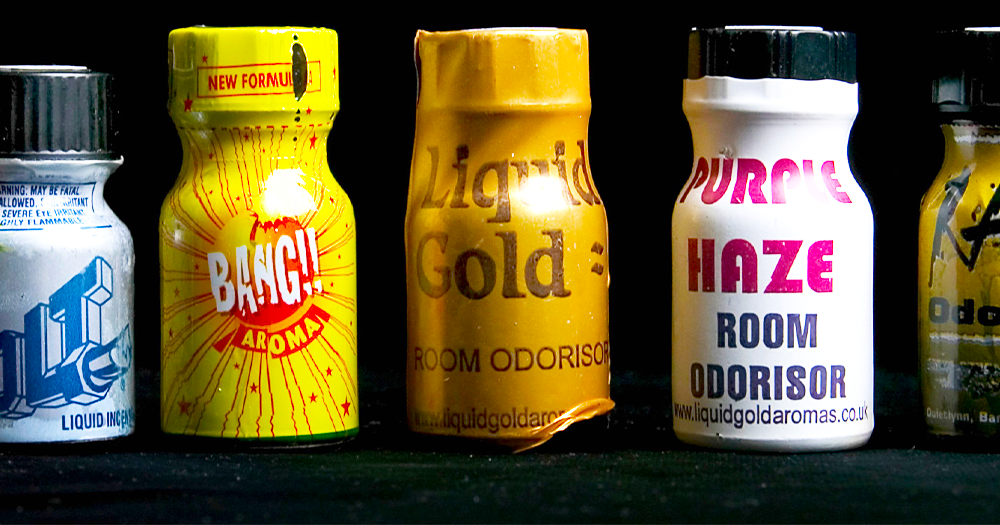The Victorian age is home to many of our most loved creations: the radio, cameras, sewing machines – and poppers. ‘Poppers’ is the street name used for a group of inhalants called alkyl nitrites. Initially synthesised in 1844 by chemist Antoine Jérome Ballard for the treatment of angina, poppers and queer culture have become linked over the decades. But how did these little amber bottles become so connected to the LGBTQ+ community?
The transition of poppers from medical to recreational use is hazy at best. After being replaced by nitroglycerin, the US Food and Drug Association deemed the severity of their effects to be minimal, making them available for over-the-counter purchasing. It became prescription-only once pharmacies noticed they were being used primarily by young, gay and bisexual men. Instead of halting their use, a market opened up. Companies began to advertise other nitrite compounds to the nice group, using imagery of lightly-clad men with six-packs to entice their target.
By the ’70s, poppers had become a popular party stimulant, giving users a brief sense of euphoria when inhaled. The nitrites cause the blood vessels to expand and blood pressure to drop, relaxing muscles and producing a lightheaded effect. Because of this, they became incredibly popular for the facilitation of anal sex by relaxing the sphincter muscles. They also induce a heightened sense of sexual pleasure. They became widely used in gay circles for their practical uses – but they have also become symbolic of queer issues.
The incomparable Charli XCX
(yelling “gay rights” holding poppers) pic.twitter.com/GcRRkrmPqW— Bobby (@BobbysByline) September 14, 2019
Like any drug, poppers can cause one to release their inhibitions when used. Contextualising that within the timeframe they began being used, this sense of freedom, combined with a clubbing environment, gave gay men confidence to explore their sexuality. The shame that surrounded homosexuality at the time was being alleviated through a non-addictive, easily purchased chemical.
The associations between poppers and queer culture have not always been positive. In 1985, a study by Paul Berg was published connecting the use of poppers to Karposi’s sarcoma, a cancer of the blood vessels. In this report, he proposed that HIV causes AIDS, but that poppers or other recreational drugs may trigger the sarcoma.
While this theory was discounted within a year of publication, it caused a subsequent wave of popper-related panic throughout the US. Self-acclaimed ‘AIDS critic’ John Lauritsen teamed up with Hank Wilson to create a pamphlet, ‘Poppers and AIDS’, warning MSM that poppers were a very likely cause of the disease. They later published Death Rush, aiming to highlight the false correlation once more. The book opens with the very first line: Don’t use poppers.
In recent years, the movement against poppers has moved into the legal realm. They were briefly made illegal in the Psychoactive Substances Act of 2016 in the United Kingdom, and in Canada, they have been outlawed since 2013. In America, butyl nitrites were banned under the Anti-Drug Abuse Act of 1998. Isopropyl nitrites have been permitted for sale as commercial products not fit for human consumption (which is why we see them advertised as ‘room odours’).
While their use has shifted to include all identities, the tie between poppers and queer culture remains prevalent. They have played an instrumental role in allowing users to express and explore their identity, becoming a hallmark of LGBTQ+ history.
Get more information about popper safety guidelines on man2man.ie.
© 2022 GCN (Gay Community News). All rights reserved.
Support GCN
GCN is a free, vital resource for Ireland’s LGBTQ+ community since 1988.
GCN is a trading name of National LGBT Federation CLG, a registered charity - Charity Number: 20034580.
GCN relies on the generous support of the community and allies to sustain the crucial work that we do. Producing GCN is costly, and, in an industry which has been hugely impacted by rising costs, we need your support to help sustain and grow this vital resource.
Supporting GCN for as little as €1.99 per month will help us continue our work as Ireland’s free, independent LGBTQ+ media.
